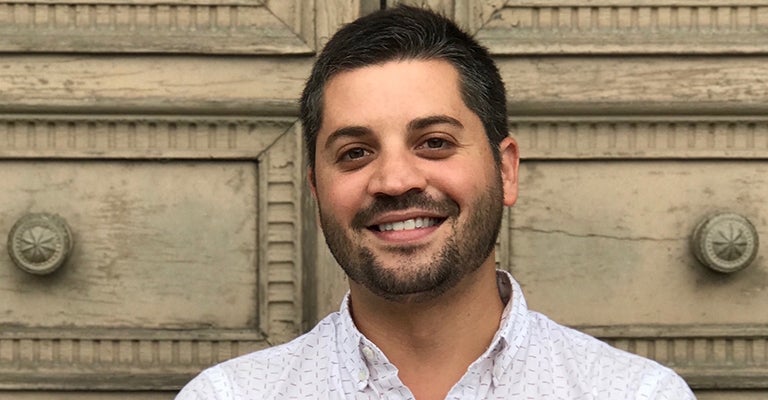Hochman Receives NEH Public Scholar Fellowship

English professor Brian Hochman has received his second NEH grant in two years for work on his upcoming book on the history of wiretapping in the United States. (Photo courtesy Brian Hochman)
August 15, 2017 — Georgetown College professor Brian Hochman has received a prestigious Public Scholar Fellowship from the National Endowment for the Humanities in order to work on his upcoming book on the history of wiretapping.
An associate professor of English and member of the American Studies and Film and Media Studies programs, Hochman has earned his second grant in two years from the NEH — both for the purposes of research on his book, tentatively titled All Ears: A History of Wiretapping in the United States. Hochman’s NEH Summer Grant from 2016 allowed him to research at the AT&T archives in New Jersey and San Antonio, which proved to contain a trove of information on mid-20th-century wiretapping practices.
While both grants have allowed Hochman to work on this project, the Public Scholar grant has a special purpose.
“It’s meant to support projects that don’t just orient themselves toward the academy, but toward the public — national issues and issues of perennial social concern,” Hochman said. “This project fits really well into that, and it’s an honor to have the blessing of an organization like the NEH.”
All Ears is a broad overview of the history of wiretapping and electronic eavesdropping, a practice which dates back to the mid-19th century — as Hochman puts it, “as long as there have been wires.”
Hochman’s Public Scholar grant will allow him to take time to conduct research for the book’s fifth and sixth chapters, which focus on wiretapping in the late 20th century.
Chapter Five deals with the 1960s and 1970s, which Hochman refers to as the “classic period” of wiretapping due to its prominent use by the FBI and involvement in the Watergate affair. But an act of Congress from this era concerning wiretapping was far more important than the role of the practice in any high-profile scandal. Title III of the 1968 Omnibus Crime Control and Safe Streets Act allowed federal law enforcement to use wiretapping in investigations of drugs, racketeering, and organized crime under judicial limitations.
“Prior to 1968, wiretapping for those investigative purposes was legally dubious. Laws governing police surveillance varied from state to state, and at the federal level there were questions about when, if ever, law enforcement could tap telephones to gather criminal evidence” Hochman said. “After 1968, as the nation gradually turned its attention to wiretap abuse at the presidential level, this far more more pervasive form of electronic surveillance was legalized and normalized.”
Under pressure from the growing contingent of politicians pushing “law and order” policies, President Lyndon B. Johnson signed the Safe Streets Act into law despite his own misgivings over Title III. The new law changed the way law enforcement fought crime for the remainder of the century, as the power to wiretap changed from a questionable measure of last resort to a common investigative tool.
Chapter Six of All Ears will examine wiretapping in the 1980s and 1990s, which brought sweeping changes from analog to digital technology that made traditional wiretapping more difficult.
“When you’re a law enforcement officer trying to bring down a drug cartel in the ‘War on Drugs,’ there’s no wire for you to tap anymore,” Hochman said.
But the government eventually found a way around new technological developments: The Communications Assistance for Law Enforcement Act of 1994 mandated telecommunications firms to build a back door for law enforcement into their networks.
Hochman also plans to prominently feature the disproportionate rate at which wiretapping has been used to investigate and prosecute communities of color during this period.
“There’s a really important story to tell about criminal justice, mass incarceration, and race as it relates to those issues,” Hochman said. “The ‘War on Drugs’ is, in effect if not in intent, a kind of race war, and a really important weapon in that war has been the wiretap.”
Much of Hochman’s research to date for All Ears has come in the form of combing archives, like the aforementioned AT&T research last year. But Hochman hopes the newest grant will allow him to take some time to interview people who were on the front lines.
“There are real people in law enforcement who underwent this transition,” Hochman said. “This grant is going to allow me to talk to the people who actually tapped wires, which is a really important perspective to bring in.”
All Ears is scheduled to be published by Harvard University Press in Fall 2019.